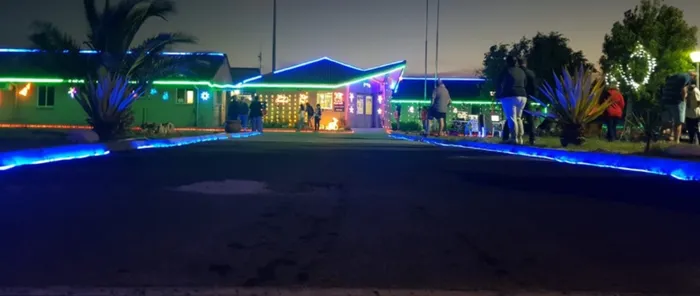Covid spikes in Milnerton, Bothasig, Table View as second wave hits

Bothasig police station closed for decontamination a day after its annual switching on of the Christmas lights after a visitor to the station tested positive for Covid-19.
The second wave of the Covid-19 pandemic is here with spikes in cases in Milnerton, Bothasig and Table View and other suburbs across the metro.
Milnerton saw a 60% increase in cases from Monday November 30 to Friday December 4, according to provincial government data. Bothasig’s cases were up 23% in the same period.
City of Cape Town data showed active cases climbed from 466 to 539 over two weeks, from Friday November 20 to Friday December 4. Bothasig’s cases rose from 261 to 303. Table View’s jumped 26% from 294 to 369 cases.
Dunoon and Parklands saw smaller percentage increases - 9% and 14% respectively - in the same period but off much bigger bases. Dunoon went from 863 to 940 cases and Parklands from 640 to 727.
Despite the rising number of cases, there are those, like Bothasig resident Josh Nienaber, who believe the pandemic is being blown out of proportion.
“I beg the government to stop with the scare tactics,” he said. “We know they are trying to close down businesses again, and they say they are trying to save lives. They aren’t trying to save lives. They just want to control us as if we’re living in a dictatorship state.”
Others, like Lynette O’Connell, also of Bothasig, say it’s those who downplay this virus and fail to take the necessary precautions who are helping to fuel a new surge in cases.
“Those of us who respect other people’s health and well-being make an effort to always cover our faces and practise social distancing. But you get those that think this is some kind of government conspiracy to get us to use a vaccine that will control us. There are bizarre people out there. The fact is that people are dying, and it doesn’t matter if it’s 2% of those that contract it. One person dying from it is bad enough.”
As of Tuesday the Western Cape had recorded 156 171 Covid cases with more than 3%, 5 125 deaths, as fatalities.
The Bothasig Residents’ Association encouraged people to wear masks, practise physical distancing, sanitise and avoid crowds. The association’s chairman, Graham Nel, said: “While Bothasig has a high number of active cases, one must remember that we have around 17 000 residents in Bothasig. As for being a ’hotspot’, I think we must accept that the majority of Cape Town suburbs qualify for this dubious honour.”
Ward 5 councillor Helen Carstens said it was the public’s responsibility to keep safe and stop the virus spreading.
“Under level 4 and 5, the government enforced very strict restrictions, and we saw that cases decreased. Now that we are under level 1, the responsibility then shifted to the people. We need to take care of ourselves and those around us. I know masks are annoying and for some can cause irritation on the skin and can irritate those that wear specs like me - often they mist mist up - but we have to think about other people as well as ourselves. When you’re around people, please wear a mask and keep a distance from others.”
It was also important at this time of year to be extra careful on the roads and not abuse alcohol, she said.
“The hospitals will be full if we have accidents and violence caused by people who abuse alcohol. This will be a disaster because beds will also be needed for Covid-19 patients.”
Meanwhile, Bothasig police station had to close for decontamination on Sunday December 6 after a visitor tested positive for Covid-19.
Grant Fisher, of Milnerton, said many people had pandemic fatigue and simply didn’t care as much as they did in the beginning.
“I think it’s normal for people to feel like they’ve played their part in trying to curb the spread of the virus and now they want to continue with their normal lives. The actual fact is that we can’t just go back to our normal lives while there are people who keep contracting the virus and dying. Luckily for us here in South Africa, we don’t have radical groups that gather in numbers to protest pandemic regulations. I think our people know deep down that it’s for the best.”
President Cyril Ramaphosa told the nation on Monday night that the Western Cape, Eastern Cape, KwaZulu-Natal and Gauteng were “leading the second wave”.
The president said the country would stay on lockdown level 1 but with a few alterations. The national curfew during the festive season would be from 11pm to 4am and all non-essential establishments would have to close at 10pm. The previous curfew was from midnight to 4am. Public gatherings may not exceed 50% capacity. Beaches in the Eastern Cape would close from December 16 to January 3. Beaches in KwaZulu-Natal would close on December 16, 25, 26 and 31. As well as January 1, 2 and 3. All Western Cape beaches will remain open. Alcohol may only be sold from 10am to 6pm from Monday to Thursday. These regulations took effect from midnight on Monday.